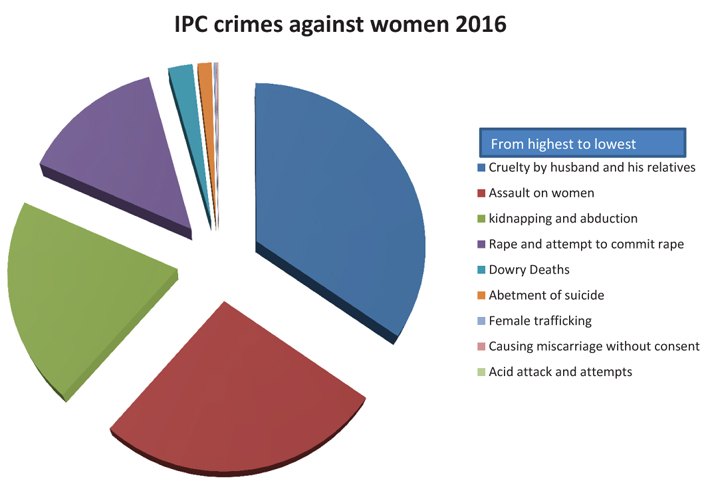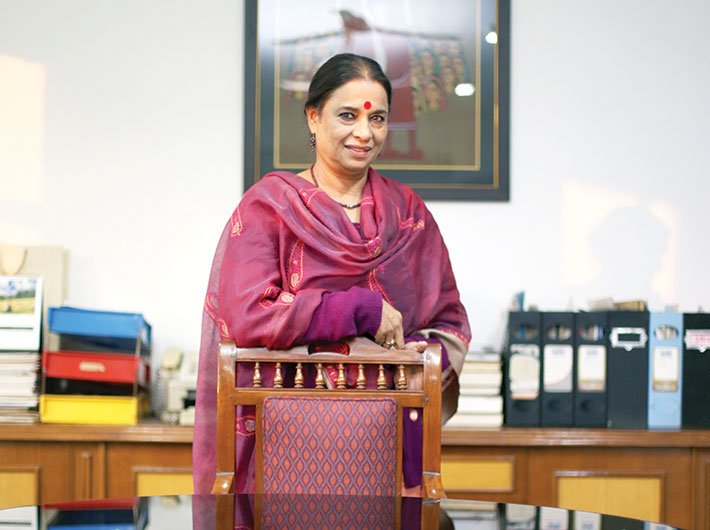Academician and social activist Dr Ranjana Kumari talks about what is wrong in our society and what we can do to make women feel secure.
Far away in the other world, she must be weeping seeing the flames of fire she lit for justice slowly fading. On December 16, 2012, the 23-year-old Delhi woman, better known as Nirbhaya now, was brutally raped. She eventually succumbed to her injuries, but not before triggering a storm acorss the country on women’s safety. Have things really changed five years later?
In 2016, India recorded an average of 106 rapes every day. The national capital witnessed 1,996 rape cases in the same year. According to the NCRB data, crime against women increased by 2.9% in the country, with 4,935 rape cases recorded through the year.
Academician and social activist Dr Ranjana Kumari talks about what is wrong in our society and what we can do to make women feel secure.
It has been five years since the Nirbhaya case. Where do we stand now in terms of crime against women?
Dealing with crimes against women is not on the priority list of the government, and the latest NCRB [National Crime Records Bureau] data speaks for it. Cases of rape have increased phenomenally, quite a big jump from 2012 when Nirbhaya case happened. All forms of crime against women increased. Police defend themselves by saying that they are recording and reporting the crime. But they do so because if they don’t file an FIR under section 376A, there will be a charge against them. These cases happen because there is no right message – no crime against women will be tolerated.
Also Read: Interview of Anju Dubey, programme officer of UN Women India
Police efficiency is under a question mark. How they [police] have reorganised themselves, or what kind of mechanism they have developed to deal with the cases of violence against women is under a big question mark. I do not see the quick response system the way it was promised. I do not see investigation or quick investigation, and this is why many cases are not able to stand in courts. I think there are a lot of problems in the way in which police are dealing with these cases, barring a few major cities in the country. India is not only about Delhi, Mumbai and Bengaluru. India is in smaller cities, towns and villages also. If this [crime] is happening in big cities then what must be happening in those small places? In those areas women are not even reporting the crime. So it is a matter of great concern that there are no serious attempts to deal with the situation and still not on priority.
Crimes are targeting even an 18-month-old baby or an 80-year-old woman. What is wrong with society?
Recently, the news came that a sexual assault happened on a four-year-old in school by the PT teacher. Not only the police, I want the society to also reflect on what kind of system we are breeding where an adult man is not sparing a small innocent baby. So in that sense, it is also society’s responsibility to start looking as to what values, morality, cultural training and upbringing we are giving. Can we term ourselves a civilised society?
What about the four-year-old boy who allegedly sexually assaulted his classmate?
We also have to understand it in psychology and psychiatric terms. Sexuality has always been a kind of mystery every individual tries to explore. We have kept it under so much of cover and taboo that open discussion never happens about it. We do not discuss it with children and don’t give them proper sex education. I did speak to the school. What happened is ‘very normal kind of thing’. Why I am saying normal is because he was exploring sexuality. Such behaviour in children is very well explained to parents in the West, and they get alarmed. But here we cannot talk about such things. In fact, we will be judged and abused by them [parents] for explaining these things.
The second thing we should pay attention to is the exposure. When we hand over a mobile phone to a child, we should be careful. The role of technology, open market for blue films and pornography, is contributing to such behaviour in children.
I think people are foolishly talking about punishing him. A four-year-old baby is not responsible for his/her behaviour. It’s the parents who are actually responsible, the school which is responsible.
Certainly, the society is observing some moral decline at the moment. We are becoming a value-less society. That’s the crisis. If you want to wear a camisole, if you want to go to discotheque, that is acceptable. But one should know how to treat the other person. But our men grow up with this whole idea of entitlement that they can get away with it. They can do it, as it is
permissible for them, and that’s something we have to change.
The government then had created a Nirbhaya Fund and Nirbhaya helpline. Are they effectively uitilised?
Nirbhaya Fund can be called a political casualty. The funds have been utilised without vision. The schemes have been formulated by the ministry of women and child development, the ministry of home affairs and the ministry of railways, with no proper implementation and vision. It was shocking that the ministry of railways was provided with Rs 500 crore for installing CCTV cameras. But what is more important is to establish a one-stop service centre in all the districts of India. When the railway ministry has its big budget then why did they take money from Nirbhaya Fund for CCTV cameras at railway stations? I raised this question, and I was told that this money was parked with the ministry of finance, and all the ministries were supposed to make a proposal showing the relevance of it for women and take the money out. I think there was no serious intent. We have seen three years of this government but the money has not been used effectively otherwise we would have had proper systems.
Why is the Delhi police not properly equipped? Why are smaller districts and towns police not equipped? That means the money is not utilised properly.
Are such crimes against women denting India’s image globally?
Recently in a workshop, a German speaker pointed out that it [crime against women] is hurting India’s economic development. Issues of safety and environment [pollution] are refraining people to open their offices in India and place their staff here. No female staff wants to work here as they worry about their safety and other staff worries about their health. Safety and health are big casualties and has a direct relationship with the economic development. So I think it is important that safety issues start getting political priority, especially in a country like India which has an image that its capital itself is not safe [for women].
For example, Delhi could have set up a special task-force to deal with crime against women, but it does not have enough police personnel. From 2012 to 2017 they did not get enough police personnel. More police force has gone to VVIPs and their children than to a common person in Delhi.
What interventions are needed?
Twenty years ago we started gender sensitisation, but even now the Delhi police has not sensitised the entire police force to deal with crime against women. There should be a fully developed course that includes investigation, forensic, and also total response system to the crime against women. That should be part of the training on crime against women.
The second point is increasing women police force in Delhi, which is still only nine percent.
The third point is as some leading dailies have reported that the home ministry is responsible for not equipping police with modern technology. So the ministry has to equip them properly. The police force should be modernised completely. I do not know what is stopping them. Indian police are more lethargic and unsmart. They talk about smart cities but if police do not become smart how cities will become smart?
The Delhi police has to be more active on Twitter. Policing has to go through a 21st-century makeover. This lathi-wielding police won’t work in the modern world. See the way the cyber crimes are increasing. They can’t keep saying rapes happen at home. Then we do not need the police if all the cases are happening at home and you can’t do anything about it.
We are gradually getting into a deep dingy hole, and if we do not act, we will not be able to see the light of the day. We feel that women, girls and girl child have no sense of freedom here. Even women from other countries feel this.
As per the NCRB 2015 report, there is less than 22 percent conviction rate in cases involving crimes against women in India. Why is the rate of conviction so low? What about redressal through the judicial system for the rights of women?
The most important thing is to shake up the judiciary. We have a tired and overburdened judiciary that lacks empathy towards women victims. This system needs a complete overhaul. There are delays and they do not understand what will happen to the life of a woman if they delay. How much risk is involved when a woman gets up and complains. They deal with crime against women like any other case. I think judiciary is not geared towards delivering justice, but it is geared for delaying justice. So that people get tired and get out of it.
In rape cases, people [victim and family] run away from Delhi. They get tortured so much that they leave midway to a village or other place for relocation. In fact, we fought a case, which ran for six years, and the victim family gave up as the girl turned 18 and they wanted her to get married. They did not want justice anymore.
What is your view on Lok Sabha member Kirron Kher’s advice to a rape victim against boarding the auto that had three male passengers?
It is normal for a working girl who is getting late to take a shared commute. I used to hitchhike to go to college. How would she understand the struggle of a middle-class woman who has to reach the office on time and deliver work? It is very normal for people in Chandigarh or any other place where public transport is not appropriate to take these options. Look at these [shared autos], at times I see girls squeezed between rascals. What all she must be going through? But that’s life as we live with such a bad transport system. Her remark was insensitive. She was eventually blaming the victim.
Do you think social media campaigns like ‘#Metoo’ make any difference?
Indian women did not come up with their own real stories; they are hesitant to share their sexual plight openly with people. Instead, they cut and paste others stories and experiences to participate in the campaign. So what was unique in the campaign was Indian women’s response. A lot of women just pasted the hashtag but did not share or accept that they have gone through it. There is still social shame attached to accepting. There is always a finger pointed towards the women, and they are worried about that. Globally, women were writing about the person, experience, institution where they had such experience, but India women did not say much. This shows there is so much hidden under the carpet. I do not think any sector, be it politics, bureaucracy, films or corporates, is clean. In fact, media also has so much of exploitation. Women are now mustering the courage. But as long as women remain dependent on men for their jobs, future and income they remain silent – which is not out of choice but circumstances.

Do women feel any safer?
Rs. 3,100 crore: Total Nirbhaya Fund
Rs. 264 crore: Funds utilised till August 2017
Over 90% of the fund for women’s safety remains unused
Rs. 2,209 crore: Worth of proposals made on women’s security from the centre and states
Rs. 264 crore: Money sanctioned for these proposals
In 2016-17, Rs. 300 crore was allocated for National Emergency Response System (NERS). The actual expenditure was only Rs. 26.45 crore.
Among many recommendations under the Nirbhaya Fund was setting up of One-Stop Centres (OSCs) called Sakhi across the country. However, as per some media reports, an NGO punctured government claims by stating that only one of the OSC is functioning; 17 of 18 one stop centres are dysfunctional.
States with highest rape-crime rate (per one lakh of female population)
| 2012 |
2013 |
2014 |
2015 |
2016 |
| Mizoram (20.81) |
Delhi (18.63) |
Mizoram (23.7) |
Delhi (23.7) |
Sikkim (30.3) |
| Tripura (12.77) |
Mizoram (17.8) |
Delhi (23.2) |
Andaman & Nicobar Island (13.7) |
Delhi (22.6) |
| Meghalaya (12.46) |
Sikkim (14.58) |
Sikkim (15.8) |
Chhattisgarh (12.2) |
Arunachal Pradesh (14.7) |
| Sikkim (11.64) |
Meghalaya (13.74) |
Madhya Pradesh (14) |
Madhya Pradesh (11.9) |
Meghalaya (13.8) |
| Assam (11.34) |
Tripura (12.84) |
Arunachal Pradesh (13.6) |
Arunachal Pradesh (11.5) |
Madhya Pradesh (13.1) |
| Source: NCRB |
pragya@governancenow.com
(The interview appears in the December 31, 2017 issue)

